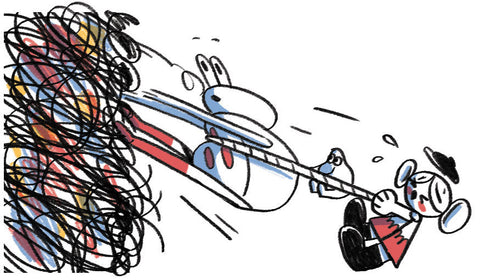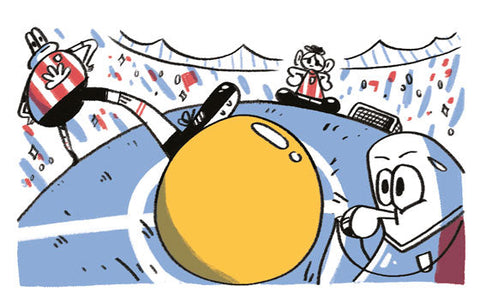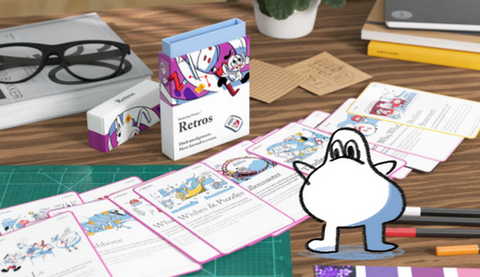ℹ️ Skip to key parts of the session by clicking on the chapter dots along the timeline.
Get ready to be playful, with Grace McCarrick, Founder & CEO of Grace Note Strategies! This live session was attended by Pip Club members who learned how to use visualisation and play to enhance team dynamics.
The video chapters above align with the chapters below, so you can combine reading the summary with watching some or all of it in detail.
Grace believes that strong team culture is profoundly life changing, and that there are easy steps to help you achieve it.
Attendees mention that they are coaches, team leaders building teams, senior managers leading managers and solo-working consultants.
Visualisation
So, why is visualisation important? Grace describes two different buckets of thinking about this: a science/behavioural bucket, and an energy-related bucket. Grace is a Reiki healer and brings energies into some of her more corporate work too.
From a science perspective, there’s a concept called future self continuity that’s been around since the 18th century, but is gaining a lot of traction at the moment. It’s about your relationship with your future self, and research shows that people who are continually able to connect their present and future selves are consistently found to be happier.
From an energy perspective, the idea is that if you can imagine something - it’s out there for you! And you’re able to call it in. What’s critical if you want to do that is to be really super clear about how you want to feel in that future.
Exercise (1)
Grace then sets up a 15-minute visualisation exercise.
What to focus on for the next 15 minutes?
- Breathe: at the very minimum, stay focused on your breathing
- Don’t censor: whatever comes up, let it come up. Logic doesn’t matter here.
- Key words: jot down any significant words, themes or descriptions that come up for you.
This write-up doesn’t include details about how Grace guides the visualisation exercise, but you can watch the video to take part yourself asynchronously any time! You’ll find yourself walking through the workplace, work and leisure activities that future you might take part in; you might be surprised at how powerful it is.
Discussion (1)
The participants described it as ‘beautiful’ and ‘relaxing’. Keith described feeling gratitude, too, which Grace says is the single strongest emotion when you’re trying to attract abundance.
She also explains how she works with her clients, discussing their experience afterwards and focusing on getting them to return to the feelings they experienced over the coming days.
Back to the practical
How can we shift our perspective a little bit to find that the team you’re in can be transformative. She describes Google’s ‘Project Aristotle’, which aims to improve team dynamics. They found that who is on the team is less important than how the team members interact, structure their work and view their contributions. Which is very positive, particularly for those of you who know there is a bit of friction between members of your team!
There will always be extremes - people who just won’t work as part of your team. But, for the most part, we can use those other elements to work with the team we have and turn it into something really special.
Exercise (2)
Get your pen and paper (or a blank doc) ready. We’ll describe this process below, but you’re missing a trick if you don’t tune into the video to hear it in full detail from Grace herself!
Have a think about a team you have been on at some point in your life that made you feel alive - excited to be there. What about them made you feel that way?
Some examples offered: camaraderie, trust, a common goal, energy, intelligent people (and therefore respect), everyone giving their all, authenticity.
Now think about a public team - fictional is fine - that you admire (Navy Seals, Minions, superheroes…). Shout out to the Pip Decks remote team culture (thanks Ece!).
Then choose a team you are currently on: your work team, your family, a sports team, a group of friends. Make sure you find it meaningful enough to use these for the next thought experiments.
- What is something weird about this group? Grace was on a kickball team that didn’t practise even once - they just showed up at games and competed.
- What is something spectacular about how you operate as a group?
- What is something that someone on that team does that delights you? Doesn’t have to be technical! Grace worked with a very quiet lady who didn’t speak often, but when she dropped one of her dry one-liners she was the funniest person in the room.
Now it’s time to fire up your imagination!
Grace explains:
There’s a group of villains by the docks, plotting to shut off electricity to the entire state of New York. It could be catastrophic! They’re holed up in a warehouse with lots of access points (they’ve got them all covered) and a group of guards, who you recognise as locals.
All you have is that team you were just thinking about. What special skills do you each have? How will you thwart the plot?
Discussion (2)
Grace and Kris shared some ideas about who they would choose: Grace would be the one to get the guards on her side (take from that what you will!).
The exercise helps you to highlight the special skills and abilities in the team and how they can blend together to create the perfect team. Because, after all, the best team is the one you’ve got (not the one you wish you had!).
A huge thanks to Grace for this wonderful and insightful session. If you'd like to host a session, all you have to do is join the Pip Club Slack channel and reach out to Ece, Pip's Community Host.









